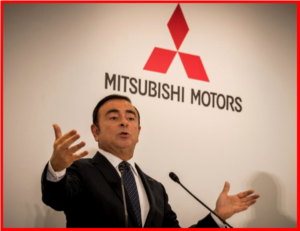 In his latest LinkedIn post, Renault-Nissan Alliance CEO Carlos Ghosn says that Nissan had a clear choice when considering its acquisition of a stake in Mitsubishi Motors: Sever ties with its longtime partner, or choose to support its revival.
In his latest LinkedIn post, Renault-Nissan Alliance CEO Carlos Ghosn says that Nissan had a clear choice when considering its acquisition of a stake in Mitsubishi Motors: Sever ties with its longtime partner, or choose to support its revival.
“We chose the latter,” writes Ghosn in a blog post. (See AutoInformed on Nissan Buys 37% of Scandal-Beset Mitsubishi Motors for $2.2B)
The move comes as investors remain skeptical of the bailout with most analysts saying “hold” the stock since February of 2015. Prior to that analysts’ forecasts said Mitsubishi would outperform the stock market.
However, Mitsubishi became enmeshed in a costly – and ultimately expanding – fuel economy cheating scandal going back to 1991. The deliberate illegal certification of its tiny kei-cars (kei jidōsha, aka microcars) in Japan started the image-damaging problem.
Ironically, Nissan discovered false ratings on the DAYZ model kei-cars Mitsubishi supplied to it. Mitsubishi ultimately admitted that there could be problems with all nine models it produced in Japan, compounding the problems for the beleaguered automaker.
Sister companies at the owner Mitsubishi Heavy Industries conglomerate showed a -10% decline in revenues for Fiscal Year 2015 were unable to bailout the Mitsubishi Motors because of pressure from investors, and possibly Japanese regulators. The strength of the Japanese Yen and chaos in global commodity markets were and are hurting the performance of the entire group.
The Mitsubishi automotive performance is not broken out on the balance sheet. However, the Machinery Group of MHI during FY 2016 had earnings of 62.2 billion Yen, down almost 33% at 29.1 billion Yen y-o-y. The steep drop came from a decrease in motor vehicle sales in Asia, and losses in the shipbuilding business.
The group previously bailed out Mitsubishi Motors at the turn of the 21st century after it was revealed that executives were covering up safety problems. Mitsubishi Motors has been in decline ever since.
Call it a “one barrel of a two-barrel shotgun wedding.” This is a giant roll of the dice with Carlos Ghosn betting on numerous “come” lines. Ghosn claims “the alliance strategy that saved Nissan from bankruptcy nearly two decades ago is inspiring the revival of Mitsubishi Motors.” (In 1999, Nissan partnered with Renault to create the Renault-Nissan Alliance. By joining forces, Nissan achieved a turnaround. Over the subsequent 17 years, both companies have grown stronger together.)
Ghosn said, “as Mitsubishi Motors faced the repercussions of misreporting fuel-economy figures earlier this year, Nissan had a clear choice: Sever ties with its longtime partner, or choose to support its revival. We chose the latter, for three primary reasons:
- It was a strategic opportunity: With Mitsubishi Motors, annual sales of the Renault-Nissan Alliance will reach 10 million units by the end of this fiscal year, putting the Alliance in the ranks of the top three global automotive groups. That gives us the economies of scale to compete with our largest competitors and maintain a significant advantage over the smaller ones.
- Mitsubishi’s strengths complement Nissan’s: We will focus on realizing synergies through joint purchasing, deeper localization, joint plant utilization, common vehicle platforms, technology-sharing and an expansion of our combined presence in both mature and emerging markets. And those synergies – which we define as actions that reduce costs and investments, avoid costs and investments, or increase revenue – are significant.
- We believe in the strength of partnership: We also believe in the power of second chances. When Nissan was struggling 17 years ago, Renault offered a hand up. We know what it’s like to face a crisis and emerge stronger. But unlike Nissan in 1999, Mitsubishi Motors has a healthy balance sheet; what’s missing is its customers’ trust. By addressing the root causes of the crisis and re-earning its customers’ trust, Mitsubishi Motors can be sustainably successful.
It will need to be done by Mitsubishi Motors itself – there is nothing Nissan or any outside entity can do to change the mindset or culture of another company. But Nissan can and will provide its skills and share its experiences from its own transformation.”
The Mitsubishi Board of Directors – with little choice in AutoInformed’s view – appointed Ghosn Chairman of Mitsubishi Motors. “In that oversight role, I will support CEO Osamu Masuko and Chief Operating Officer Trevor Mann, who will handle day-to-day operations of the company. By serving as Chairman, I can help ensure Mitsubishi Motors benefits from and contributes to the Alliance.”
Ghosn claims that Nissan and Renault will benefit from this new “partnership,” starting immediately with savings from joint purchasing. “Other examples will include the ability to leverage Mitsubishi’s know-how in Japan’s popular kei car segment, to adopt Mitsubishi’s systems for plug-in hybrid electric vehicles, to capitalize on its strength in pickup trucks, and to build on its successful operations in Southeast Asia.”
Ghosn boldly claims that “the synergies will return 10% of Nissan’s investment in 2017, and more than 20 % the year after”
That of course leaves a trivial less than trivial 70% investment gap to worry about.
Here’s the giant caveat: “Of course, the success of any alliance is never guaranteed. Others have tried and failed. But the Renault-Nissan Alliance has 17 years of experience that we can apply to this next challenge in our unique and successful story of global, cross-cultural cooperation,” Ghosn claimed.

